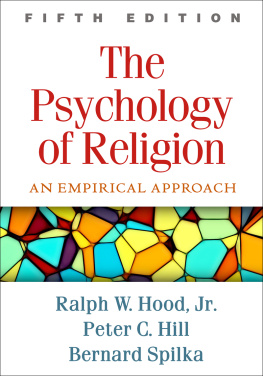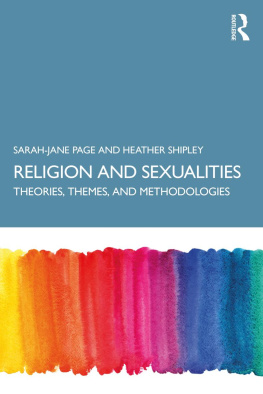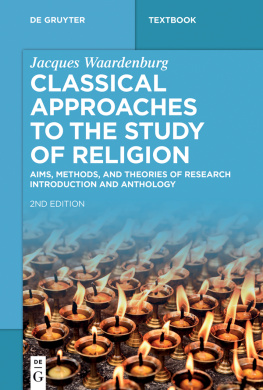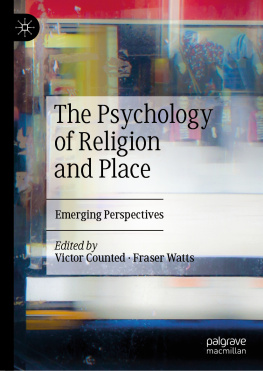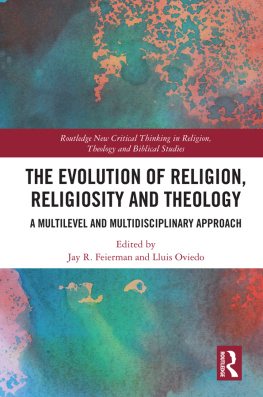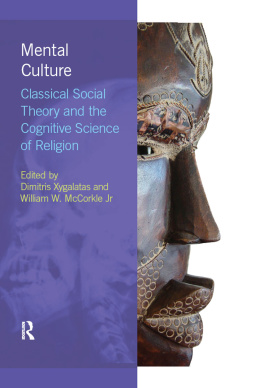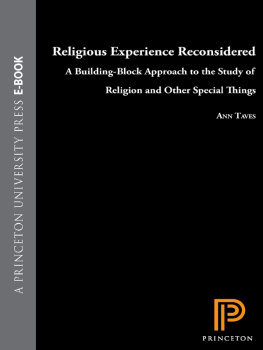The Psychology of Prayer: A Scientific Approach
Bernard Spilka and Kevin L. Ladd
The Psychology of Religious Fundamentalism
Ralph W. Hood, Jr., Peter C. Hill, and W. Paul Williamson
The Psychology of Religion
AN EMPIRICAL APPROACH
FIFTH EDITION
Ralph W. Hood, Jr.
Peter C. Hill
Bernard Spilka
THE GUILFORD PRESS
New York London
To Emery Grace Jorgensen
Ralph
To Carol
Peter
To Ellen, for 65 years of love,
support, and guidance.
My love for you continually grows.
Bernie
Epub Edition ISBN: 9781462536023; Kindle Edition ISBN: 9781462536009
Copyright 2018 The Guilford Press
A Division of Guilford Publications, Inc.
370 Seventh Avenue, Suite 1200, New York, NY 10001
www.guilford.com
All rights reserved
No part of this book may be reproduced, translated, stored in a retrieval system, or transmitted, in any form or by any means, electronic, mechanical, photocopying, microfilming, recording, or otherwise, without written permission from the publisher.
Last digit is print number: 9 8 7 6 5 4 3 2 1
Library of Congress Cataloging-in-Publication Data is available from the publisher.
ISBN 978-1-4625-3598-9 (hardcover)
Ralph W. Hood, Jr., PhD, is Professor of Psychology and Leroy A. Martin Distinguished Professor of Religious Studies at the University of Tennessee at Chattanooga. He is past president of the Psychology of Religion division of the American Psychological Association and a recipient of its William James Award, Virginia Sexton Mentoring Award, and Distinguished Service Award. He is cofounder of The International Journal for the Psychology of Religion, for which he has served as coeditor and book review editor. Dr. Hood has also been editor of the Journal for the Scientific Study of Religion and is currently coeditor of Research in the Social Scientific Study of Religion.
Peter C. Hill, PhD, is Professor of Psychology at Biola Universitys Rosemead School of Psychology in La Mirada, California. He is past president of the Psychology of Religion division of the American Psychological Association and a recipient of its William C. Bier Award and Distinguished Service Award. He is editor of the Journal of Psychology and Christianity.
Bernard Spilka, PhD, is Professor Emeritus of Psychology at the University of Denver. He is past president of the Psychology of Religion division of the American Psychological Association and a recipient of its William James Award and Distinguished Service Award. Dr. Spilka has also been vice-president of the Society for the Scientific Study of Religion and president of the Colorado Psychological Association and the Rocky Mountain Psychological Association. Now retired, he continues to write on the psychology of prayer and on religion, evolution, and genetics.
A t the beginning of the 20th century, those who were to become highly esteemed figures in the history of psychology and its sister disciplines focused much of their interest and attention on religion. In academic psychology, scholars such as William James and G. Stanley Hall not only helped to found psychology, but manifested a great interest in the psychological study of religion. In psychoanalysis, a new field was created outside of academic psychology that nevertheless immensely influenced psychology. One cannot read Freud or Jung for long without encountering extensive discussions of religion.
The second quarter of the 20th century saw a rapid decline in the study of religion among psychologists. Behaviorism was indifferent to the topic, while psychoanalysts relegated it to the province of psychopathology. The net effect was that research in this area remained on the periphery of scientific respectability. The mid-1950s, however, saw a renaissance in the study of religion. Perhaps as psychology became more secure as a science, it could once again look with some interest into the serious investigation of religion. This time the study was less speculative, not as concerned with grand theory, and focused on issues other than the origin of religion. In a word, an empirical psychology of religion emerged. This was a more limited view, to be sure, but it demanded that statements about religion be formulated as hypotheses capable of empirical verification or falsification.
In rapid succession, journals devoted to the empirical study of religion emerged in the middle of the last century. Among these were the Journal for the Scientific Study of Religion, the Journal of Religion and Health, and the Review of Religious Research, as well as three journals with specific religious interests: the Journal of Psychology and Theology, the Journal of Psychology and Christianity, and the Journal of Psychology and Judaism. More recently, additional journals and annuals have appeared, including The International Journal for the Psychology of Religion; Research in the Social Scientific Study of Religion; Mental Health, Religion and Culture; and Spirituality and Health International. Since the fourth edition of this text was published, the American Psychological Association has introduced the journal Psychology of Religion and Spirituality.
Likewise, the Archiv fr Religionspsychologie (Archive for the Psychology of Religion), once the yearbook of the Internationale Gesellschaft fr Religionspsychologie (International Association for the Psychology of Religion), founded in 1914, has been revived and is now published as a journal; this indicates that the psychology of religion has proven to be a topic of truly international interest. The pertinent literature continues to grow at a rapid rate across the globe. Specialty journals such as the Journal of Muslim Mental Health address religious traditions other than Christianity, which has been long dominant in the work of American scholars of the psychology of religion. The domination of interpretative and conceptual discussions of religion in psychology is gradually yielding to data-based research and writing that are pulling the psychology of religion into the mainstream of academic psychology. Likewise, several general and specialty handbooks focusing largely on empirical studies of religion and spirituality have been published. The appearance of the fifth edition of this text is itself an indication of the vigor of our field. Finally, the psychology of religion is now a frequent topic in mainstream psychology journals, indicating the increased frequency of experimental studies in the field.
Our aim remains the same in the fifth edition as in the first four: to present a comprehensive evaluation of the psychology of religion from an empirical perspective. We are not concerned with purely conceptual or philosophical discussions of religion, or with theories that have little empirical support. Interesting as these approaches may be, they generate few, if any, hard data of relevance to their evaluation. We do not, however, ignore these theories when meaningful empirical predictions follow from their claims. When this occurs, they are considered, as are other hypotheses, tentative claims to be judged by the facts. We have not imposed a single theoretical perspective across all the chapters. However, we do see the issue of meaning and control as the single most general theme running through each of the chapters. We avoid siding unequivocally with any of the emerging grand theories, such as evolutionary psychology, that have been proposed to integrate the psychology of religion. Likewise, we do not give exclusive dominance to a single empirical approach, such as cognitive science; nor do we unequivocally endorse emerging areas of psychology, such as positive psychology. Instead, these theories, approaches, and areas are integrated where relevant throughout the text. We simply approach the field from an empirical perspective, broadly conceived to include any studies in which either quantitative or qualitative data are germane to establishing and/or resolving questions of fact. Although we are sensitive to the difficulties and limitations of a purely empirical approach, we have not abandoned the commitment to empiricism as the single most fruitful avenue to understanding the psychology of religion. However, as several of the chapters also reveal, the same empirical data can lend credence to radically different ontological claims. Since the work of William James, texts on the psychology of religion have suggested various metaphysical options under which the same empirical data can be viewed with radically different consequences. All we ask is that our readers not lose sight of the empirical data, so that various theoretical interpretations can be recognized and evaluated in terms of their relationship to these data.
Next page
